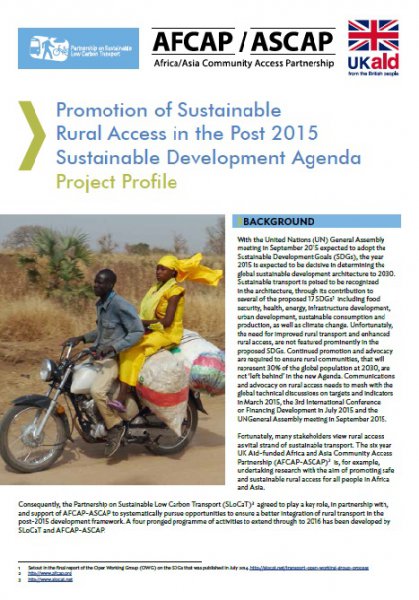SLoCaT Partnership and AFCAP-ASCAP Cooperate to Promote Role of Rural Transport for Post-2015 Development Framework

Shanghai- March 4th, 2015
Rural Communities will represent 30% of the global population in 2030, and it is vital that they are not “left behind” in the new post-2015 development framework…
Rural Communities will represent 30% of the global population in 2030, and it is vital that they are not “left behind” in the new post-2015 development framework, which is currently being negotiated in United Nations (UN) General Assembly in New York in the lead up to a September 2015 summit of world leaders. This summit is expected to result in the adoption of a set of Sustainable Development Goals (SDGs) that will guide international development policy over the next 15 years in the same manner as the Millennium Development Goals (MDGs) guided and accelerated development policy over the last 15 years.
In the case of rural transport there is still a considerable amount of unfinished business as need for improved rural transport and enhanced rural access, which are key for rural development and food security are not featured prominently in the proposed goal structure that forms the basis of current negotiations in the UN General Assembly. In the July 2014 Outcome Document of the Open Working Group on Sustainable Development Goals, that guides the current negotiations sustainable transport was integrated into 7 out of the proposed 17 goals and while the proposed goal framework provides opportunities to pursue much needed improvements in rural transport infrastructure and services; there is a need of continued promotion and advocacy to get a boost of the SDG framework in developing enabling policy, regulatory and financing frameworks for rural transport.
“We are looking forward to the cooperation with the SLoCaT Partnership in taking the case of sustainable rural transport to policy makers on sustainable development at the global level. We have followed the work of the SLoCaT Partnership over the last years and have been impressed by its success in developing an effective global voice on sustainable transport” said Joseph O. Haule, Chair of the Africa Community Access Partnership (AFCAP) Steering Group.
The Africa and Asia Community Access Partnership (AFCAP-ASCAP) is a six-year research program, funded by UK Department for International Development (DFID) and supported by participating governments and development partners, that promote safe and sustainable rural access for all people in Africa and Asia. The program supports knowledge sharing between participating countries in order to enhance the uptake of low cost, proven solutions for rural access that maximise the use of local resources. Through a portfolio of research, demonstration, advisory and training projects, AFCAP-ASCAP seeks to feed outcomes of its activities directly into regional and national transport policies and strategies for poverty reduction.
The Partnership on Sustainable Low Carbon Transport (SLoCaT) is a multi-stakeholder partnership of over 90 organizations (representing UN organizations, Multilateral and Bilateral development organizations, NGOs and Foundations, Academia and the Business Sector). Its main objective is to promote the integration of sustainable, low carbon transport in global policies on sustainable development and climate change. The global advocacy of the SLoCaT Partnership on sustainable, low carbon transport is guided by the SLoCaT Results Framework on Sustainable Transport, which defines the 2030 vision of the Sustainable Transport community on what should be achieved in terms of improving rural, urban as well as national and regional access to goods, markets, jobs and services while minimizing the negative impacts on road safety, air quality and climate change. Leading up to the Post-2015 Summit of the UN General Assembly in September 2015, the SLoCaT partnership will continue to promote appropriate targets and indicators to help ensure that the SDG framework will be of equal value to the rural transport community as it is to the urban transport community.
“The cooperation with AFCAP-ASCAP offers the SLoCaT Partnership a unique opportunity to further develop its activities on rural transport, which is of key importance in strengthening political support for the overall agenda on sustainable transport,” says Cornie Huizenga, Secretary General of the SLoCaT Partnership. “This in turn can help to accelerate on the ground action on rural transport infrastructure and services and improve the lives of hundreds of millions of people in rural areas, which currently lack access to markets and essential services”.
The SLoCaT Partnership will play a key role, in partnership with, and with the support of AFCAP-ASCAP, to systematically pursue opportunities to ensure a better integration of rural transport in the post-2015 development framework. The overarching goal towards which the Project contributes is “Realizing sustainable Basic Access at affordable cost” and is being implemented through advocacy in official fora, integrating views of rural access stakeholders in an effective process of dialogue, developing technically sound and well supported indicators for rural access, and identifying the key financing needs for scaling up sustainable rural transport infrastructure and services.
To download the press release, please click here.
 For more information: See the project profile for the joint SLoCaT – AFCAP Program
For more information: See the project profile for the joint SLoCaT – AFCAP Program
Contact person:
Gary Taylor, Africa/Asia Community Access Partnership (AFCAP-ASCAP) gary.taylor@cardno.com.uk, www.afcap.org.
Cornie Huizenga, Partnership on Sustainable Low Carbon Transport (SLoCaT) cornie.huizenga@slocatpatnership.org, www.slocat.net